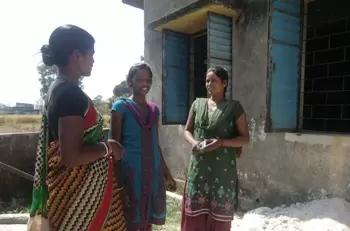Barefoot auditors sing songs to make woman dance to their tunes

11-May-2015
Vol 6 | Issue 19
A lilting tribal tune catches the attention of the gaggle of women gathered at the Integrated Child Development Services (ICDS) centre in Jidu Pandra village that falls in Ormanjhi block of Jharkhand’s Ranchi district.
Almost at once, all eyes follow the sound that is coming from the farthest corner in the room. As they keenly listen to the beautiful voice of Suman Devi, 25, singer and composer, gradually the Nagpuri lyrics explaining the ill-effects of child marriage start to sink in.
 |
|
Thanks to the efforts of barefoot auditors, or Gram Arogya Sakhas, almost all childbirths in the last three years have taken place at a hospital (Photo: Ajitha Menon\WFS)
|
When the melody comes to an end, in the ensuing stillness, Suman opens a discussion on healthcare for women and adolescents.
“Songs have greater appeal than lengthy speeches. They help me break the ice with the community. I write, compose and sing songs on health, sanitation and regressive social practices such as child marriage and dowry.
“I initiate every meeting with a musical number and once I know everyone’s listening I go on to talk on subjects like the need for immunisation, taking iron pills, nutrition for pregnant women, and so on,” reveals Suman, the barefoot auditor for Jidu Pandra village.
There are 70 barefoot auditors, or Gram Arogya Sakhas, working in as many villages across 15 Gram Panchayats in two blocks of Ranchi and Hazaribagh districts, sensitising rural communities on government health schemes and helping them avail and monitor the services.
“Each of the 70 villages in our intervention area has a barefoot auditor who is a part of the village and acts like a bridge between health service providers and the beneficiaries for the best implementation of government schemes,” says Faiz Ahmed, Project Coordinator, Child in Need Institute (CINI), Jharkhand.
The barefoot auditors have been selected and trained through intensive workshops conducted by CINI, a non-government organisation working on mother and child health, under Oxfam India’s DFID-supported Global Poverty Action Fund initiative, ‘Improving Maternal Health Status in Six States of India’.
Of the 70 committed, hand-picked volunteers, 60 are women. “I had to go to every home in the village and ask women to come for meetings to talk about health matters.
“Despite being from the community, I faced a lot of resistance. There was a general unwillingness to take time out. The progress was gradual, but once the benefits of information became apparent, more and more women started turning up on their own,” shares Poonam Devi, 25, the barefoot auditor of Chetanbari village.
As a practice, the barefoot auditors take advice and guidance from field animators, also trained by CINI. For every seven villages, there is one field animator who plans awareness strategies and monitors the implementation of health services.
To this end, s/he lends valuable assistance to the barefoot auditors to enable them to effectively sensitise the community.
“The barefoot auditors’ network has been doing exemplary work. Together we have ensured that health interventions that have the potential to save lives of women and children and prevent malnutrition among infants are being delivered competently,” explains Siben Devi, 32, field animator in Palu village, which falls under Chutupalu panchayat.
In each of the 70 project villages, the impact of the intervention is visible. Today, the ICDS is functioning without a hitch, infants get their government-sponsored meal on time everyday and their height and weight is being tracked to monitor malnutrition.
The Anganwadi workers and the Sahiyas carry out the routine immunisations without fail, the pregnant and lactating women get their nutrition packets every month.
The women and adolescent girls are taking their iron pills and the blood testing for anaemia is being done on a regular basis. The expectant women are going for all the four pre-natal check-ups and their blood pressure and sugar levels are being watched closely.
Almost all childbirths in the last three years have taken place at a hospital and the infant mortality and maternal mortality have notably been very low in all these villages in this period.
“Our barefoot auditor Rita Kumari has changed our lives. Earlier, we had no idea about the government health services let alone availing of them or benefiting from them.
“It is her repeated counselling and campaigning that has made everyone in the village realise the significance of these services. Nowadays, we treat her advice as gospel truth,” says Gudiya Devi, 35 of Palu village.
In the last three years, only one woman in Palu has died in childbirth and that too because her husband failed to call the barefoot auditor or the free Mamata ambulance service when her labour pains started, despite repeated counselling in the past.
“We give our number to the pregnant women and their husbands and also write the number for the free ambulance service available under the Janani Suraksha Yojana [a safe motherhood intervention under the NHM] on the walls of their homes and at the village office.
“The moment we get the call, we ring for the free ambulance and reach the pregnant woman’s house. I have often accompanied the women to the Primary Health Centre or the hospital,” says Rita Kumari, 26, Palu’s esteemed barefoot auditor.
Besides solving their health problems, the barefoot auditors have won the confidence of the younger girls as they staunchly stand up against child marriage, domestic violence and dowry.
Take the case of Gudiya, 15, of Bada Ulatu village. When she discovered that her parents had fixed her marriage, she sought the help of Poonam Kumari, 20, the barefoot auditor.
Not only did Poonam speak to the marriage broker, Rashmi Devi, and pointed out that she could end up in jail for facilitating an underage union, she even got Rashmi to convince Gudiya’s parents to break the alliance.
Talk about barefoot auditors in any of the 70 villages and there are many glorious stories that people come forward to share. Clearly, they have emerged as a skilled force that is providing much-needed counsel, improving access to healthcare and gradually turning the wheels towards positive social change. - Women's Feature Service














